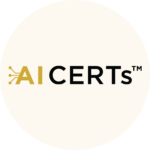
Jatin Vaghasia
9 months ago
AI Compliance Certification- Boosting Your Career and Shaping the Future
Artificial intelligence (AI) has been the biggest buzzword recently since ChatGPT debuted in the market. With increased efficiency, improved productivity, and hyper-personalization, every business wants AI integration. However, rising ethical concerns related to biased algorithms, data privacy, and discriminatory outcomes have sparked another debate, raising questions about AI-based decisions. Lack of transparency and potential misuse of AI are additional issues that need immediate attention as numerous companies shift to AI models, resulting in many job displacements. Companies must ensure ethical and regulatory guidelines for unbiased and smooth integration of AI. This is where AI compliance comes in, which requires expertise to deal with the regulatory aspect.

What is AI Compliance?
As AI assumes more decision-making roles, ethical considerations and responsible development become paramount. Imagine AI as a powerful engine – its potential is undeniable, but without proper safeguards, it could careen off track. Here’s where AI compliance steps in. It plays a crucial, yet often overlooked, role in the AI revolution by ensuring these systems are developed and used responsibly, in accordance with legal and ethical frameworks.
Here’s what it entails:
- Checking companies, institutions, and organizations whether they are misusing AI-powered systems or not.
- Checking that the data collected to train AI systems is legal, ethical, and from different stakeholders.
- It guarantees that AI-powered systems deployed in the organization are not discriminatory against any group or individual.
- Checking whether AI system is not misused to manipulate or deceive people anyway.
- Ensuring that AI-powered systems don’t invade anybody’s privacy or cause any harm to them.
- It also assures that AI-powered systems are for the betterment of society and are employed responsibly.
Why is AI Compliance Important?

AI has not always been compliant, and there are many instances in which artificial intelligence poses ethical and security threats. Concerns about bias, privacy, and transparency have existed with AI’s widespread adoption.
In 2018, Amazon removed a covert AI-powered hiring tool because of its biased outcomes against women. The machine learning model portrayed men as the ideal candidates, resulting in the predominance of men in the IT industry.
Another example of dubious data handling in AI is morphed images, where a Facebook app leaked data to a Russian company in 2022. An oddly written privacy policy stating that any photographs shared by users are effectively the property of FaceApp is yet another example.
However, regulatory bodies are actively developing frameworks for AI development and deployment. It would ensure:
- AI systems are fair and unbiased.
- Protection of data privacy through regulations like GDPR and CCPA.
- AI systems are transparent and accountable, allowing for auditing.
How Do You Ensure AI Compliance?
AI compliance ensures ethical use of AI technology, nurtures customer trust, protects data, and mitigates risks associated with legal consequences. A recent Gartner report predicts that by 2025, 60% of large organizations will have adopted some form of AI governance framework.
- To ensure that your organization is AI-compliant, here are the best practices you should follow:
- Establish clear policies and procedures to use AI in development, deployment, and integration.
- Develop a comprehensive AI compliance policy for the organization.
- Check whether all AI systems are compliant with applicable AI regulations.
- Create a framework for AI governance and follow it judiciously.
- Ensure data privacy and security in the organization.
- Establish an audit process for AI systems for structured assessment to ensure it aligns with defined goals, standards, and legal requirements.
- Establish a reporting process and ensure timely response to compliance issues.
- Train your workforce on AI regulations requirements for smooth functioning.
- Use automated tools to continuously monitor AI systems and ensure they are compliant with AI governance.
While understanding AI compliance requirements might seem manageable for experienced AI and data professionals, those who are new to the field may find it challenging. An AI Compliance Certification from a globally recognized organization can be a straightforward way to gain the necessary knowledge.
A certification would help professionals and organizations understand the implications of non-compliance with AI regulations. It would ensure that their systems are AI-compliant, and that data is protected.
Need For AI Compliance Certifications
As more businesses embrace AI, there’s a need for regulation and compliance to ensure ethical AI use. According to Forbes, the global AI compliance market is expected to reach USD 12.7 billion by 2027, reflecting the growing demand for expertise in this field.
An AI compliance certification would equip professionals with the knowledge and skills to navigate the complex world of AI regulations and best practices.
Benefits of AI Compliance Certification for Your Career
1. Increased employability
Earning an AI compliance certification shows your commitment to responsible AI development, establishes your credibility, and positions you as an asset to potential employers.
2. Career Advancement
A study by Indeed found that job postings mentioning “AI compliance” have increased 300% in the past three years. With expertise and knowledge, you can find many opportunities to help you advance in your career. The AI compliance certification presents you with higher-level positions and leadership roles.
3. Enhanced salary potential
With increased job roles focused on AI, studies suggest that AI skills can lead to a 10-20% salary hike compared to other roles without such expertise.
4. Competitive edge
Professionals with the certification will enjoy an upper hand over their contemporaries in the competitive job market. Their specialized knowledge and dedication to ethical AI development and deployment will showcase their focus on AI compliance and performance, giving them a competitive edge.
5. Deeper knowledge
Professionals will gain a deeper understanding of complex legal and compliance concepts. An The certification will help them gain expertise in AI regulations, data privacy laws, and ethical considerations to better navigate the intricate and ever-evolving needs in this area.
6. Improved collaboration
Another benefit of earning an AI compliance certification is improved collaboration, where AI professionals can work effectively with legal teams. This will bridge the gap between compliance and business teams, where AI professionals can help at both ends—technical development as well as ethical considerations.
7. Increased client trust
An AI compliance certification shows your commitment to AI ethics. It also shows that you are against any biases or data breaches that increase client trust, and he is likely to consider this a positive factor before proceeding with your services.
Benefits of AI Compliance for Businesses
1. Mitigates risk of regulatory non-compliance
Regarding AI regulations and governance, a compliance certification will demonstrate your expertise in emerging AI regulations and promote standardized practices. It facilitates internal audits, reviews, and regulations, eliminating the risk associated with non-compliance.
2. Builds trust with customers and stakeholders
Businesses and customers are becoming concerned about data breaches and biased algorithms. It will showcase your dedication to ethical AI deployment, which will build trust with customers and other stakeholders. It ensures your commitment to responsible AI practices.
3. Enhances AI transparency
The certification will ensure the development of transparent AI models, which will help gain employee and client confidence. It will also facilitate a deeper understanding of how AI has reached certain decisions, letting others know how AI works inside out and ensuring transparent processes.
4. Improves decision making
It makes you aware of legal practices, procedures, and regulations leading to quality data selection. Considering the legal aspects, the right processes will ensure that the correct data analysis is conducted, leading to accurate and unbiased results.
5. Builds a culture of ethical AI
The certification will promote a culture of ethical AI development and deployment, emphasizing the legal aspect, human oversight, and ethical considerations. It will prioritize responsible AI use, eliminating any biased and discriminatory elements in the process.
6. Have a positive societal impact
Investing in AI compliance certification will ensure that we all use AI and benefit from it holistically. It will promote fairness and inclusivity, thus having a positive societal impact.
Choose the Right AI Compliance Certification
- Define your goals before you proceed with AI certification and consider your experience and existing field. Make sure the certification you are choosing aligns well with your long-term goals.
- Research course content to ensure it aligns well with your learning objectives. Assess the applicability of the certification, framework, and what it covers.
- Choose globally accredited and recognized certifications from reputable organizations, institutions, or entities endorsed by prominent figures in the AI landscape.
- Choose certifications that fit in your current work routine. Consider the learning format and check whether it supports exam preparation.
Ready to Take the Next Step?
AI compliance is more about shaping the future with ethical and responsible AI development and governance practices. Getting an AI certification will establish you as a thought leader and a driving force, inspiring millions to contribute to positive technological impact.
Invest in AI certification from AI CERTs™ for a rewarding career and for responsible development of AI technology. Connect with us to discuss your needs; we will help you build a better future in AI.